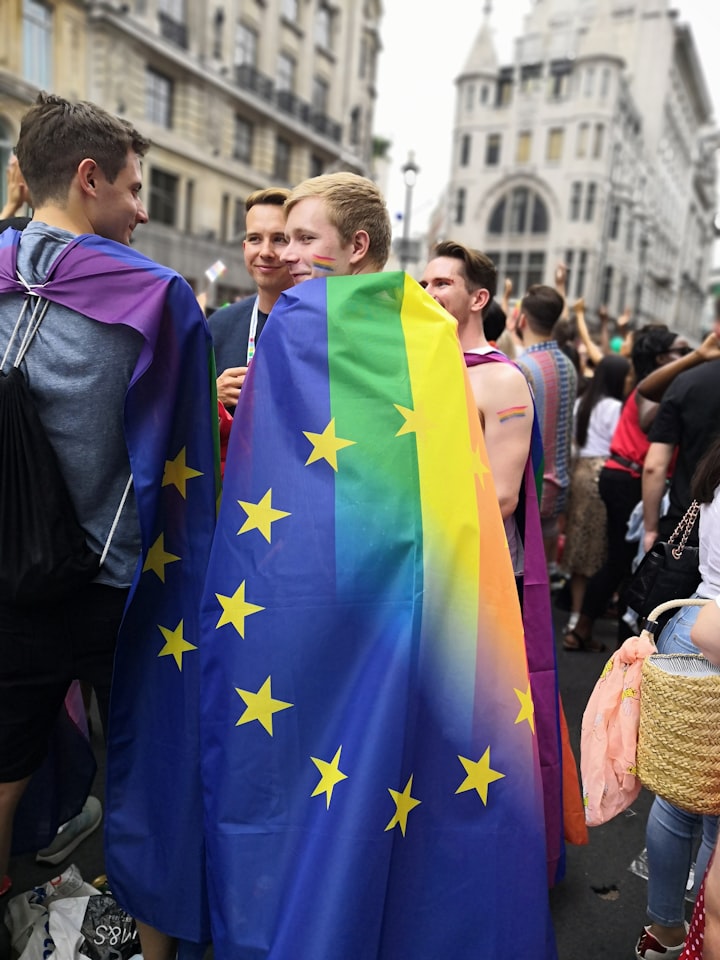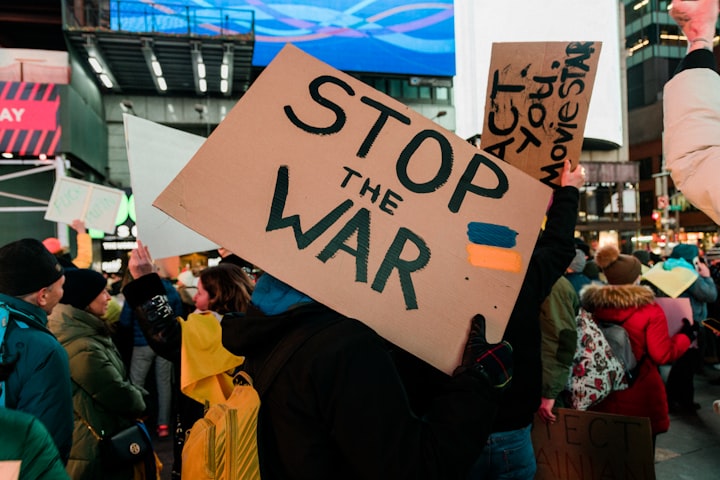Eastern Europe's LGBTQ+ Opposition, Explained
The generation without diversity

The subject of sexuality remains sensible to this day, regrettably we must add. Weirdly enough, unlike with other similar subjects, opinions on the LGBT community are group mostly geographically, although this topic requires a profound and personal perspective, and not a community-driven one.

In most areas of the civilized world, the general standpoint is somewhat neutral, but in Europe, especially the Eastern area, homophobia appears to be disturbingly present.
Some could argue that a better appreciation margin would be by age-group, and I somewhat agree with the argument. However, I must make it clear that among the primary reasons for writing this article is the surprisingly large number of young people with homophobic tendencies I’ve met over the years. Especially when considering that most of these individuals would generally be regarded as educated and open-minded.
Thinking about the subject for a little while made me identify a few factors which I profoundly believe to be the primary causes of this primitive mentality, even during these times when the Western influences are stronger than ever in Eastern Europe.
With that in mind, it’s also worth mentioning that this topic is more complex than I’d initially believed, and I’m going to do my best to give you a clear image of the situation.
Personal note here, I consider myself to be heterosexual, but I completely respect the LGBT community, as a profound advocate for equality. As a last disclaimer, I am aware that political correctness is very important, especially online, and in case I somehow offend anyone with my choice of words or personal attitude, please know that none of that was intentional. My apologies if needed!
The Current Scenario
Historically, Eastern Europe has found itself on the wrong side of the continent multiple times. With difficult access to the ocean, come limited trade routes, and with massive mountains bordering most states, isolation is a given.

The current Eastern European perspective on the LGBT community is highly antagonistic, especially in individuals over the age of 40. Although it is true that older generations have a harder time accepting the ideals of a free sexuality, the alarming issue resides in the teenage and young adult population.
Growing up with the internet and in a globalized society, the younger age groups are typically more open-minded, with a clearer view on the subject of sexuality. Yet, in Eastern Europe, homophobia has been passed down onto the newer generations with disturbing success.
In an effort to explain the origins of this regrettable scenario, we need to analyze the primary components of this hateful mentality…
The Religious Influence
Eastern Europe is perhaps unsurprisingly a traditionalist region. The religious scene is dominated by the Abrahamic, monotheist beliefs of Christianity, with the notable prevalence of Eastern Orthodoxy and Catholicism. Protestant religions also have a strong presence, yet their involvement in the political field is less contoured.

Bulgaria, Romania, Moldova, Montenegro and Serbia are predominantly Orthodox, while the majority of the population in countries such as Poland or Slovakia follow the Catholic beliefs. Hungary is mixed with Protestants and Catholics, but the homophobic situation is largely credited to another factor, not necessarily religion.
Orthodox tradition is, in my opinion, shrouded in more religious formalism than most of its Christian alternatives. God’s will receives strong spiritual presence, in a strict interpretation. It is also worth noting that in most of Eastern Europe, a considerable percentage of the population still lives in rural communities, where the importance of the church is even more accentuated.
As many of you are already aware of, the Bible is sometimes inconsistent when it comes to drawing the line between certain ideals. On one side, Christians are told to love and care for each other, while on the other, certain behaviors and their practitioners are deemed as sinners, who are excluded from the Lord’s empire.
This line of thought has received dramatically different interpretations, based on specific social and political factors. In the case of the Orthodox church, this has predominantly been used to rule against homosexuality, and against any sexual practices which do not fit the theme of the “traditional family”.
While the religious influence over the global population has primarily been in rapid decline, this rate does not apply as evenly in Eastern Europe. Not to antagonize religion by any means, but when it comes to the subject of the LGBTQ+ community, the sensitive line between acceptance and despise is often times crossed, and not by the religious teachings themselves.

The subjectivity of each priest, local pastor or devout believer is arguably the origin point of the homophobic biblical arguments. Christianity, especially in Eastern Europe, takes a more tyrannical approach to God’s will, as we are constantly reminded to fear the Lord’s divine judgment.
Thus, by claiming that untraditional sexuality acts against God, especially by a representative of the church, it becomes fairly simple to paint a sinful image of the LGBT community.
Although not the strongest factor, and certainly one which steadily loses ground in the social life, the oppressive religious influence did play a substantial role in the development of the current situation. Even more so when we consider the next factor…
The Communist Era
Supposing that we’re all familiar with the brief history of totalitarian regimes in the 20th century Europe, our attention is going to focus less on the history, and more on its consequences.

Especially in the aftermath of World War Two, Stalin’s Soviet Union had an even stronger influence on the European scene, primarily the east. Most countries were forced into an era of communist rule, while others “willingly” chose this governmental option. The long, painful years of oppression, suffering and misery impaired the social evolution in the affected areas, by heavily promoting the socialist ideology. Kids learned about the greatness of communism in kindergarten and school, while the political opposition was being either imprisoned or executed.
This totalitarian “brainwashing” was centered around a few primary “values” of the socialist ideology, which we need to further discuss.
Pride, glory and tradition
One of the most pronounced attributes of the totalitarian regime is the concept of “self-glorification”. Parades dedicated to the communist ideology and leader, active censorship which eliminates the presence of Western influences, whilst promoting the apparent success of socialism, and so on, were all present in Europe during the communist era. One particular aspect which many remember to this day is the concept of “national values”, a set of ideals to be proud of, largely concentrated around conservatism.
You might be asking yourself, what does this all have to do with the LGBT community?
Firstly, we need to consider a fundamental principle behind communism, equality among citizens. Ideally, 99% of the population would work in the nationalized factories, agricultural plains, or socialist institutions, in order to contribute to the nation’s ascent. But one aspect tends to be overlooked, a demand for fresh workforce, from the kids who were born and raised under the communist ideology.
Thus, abortion became illegal, as the governments wanted each and every couple to eventually have children, and abortion also went against the biblical line of thought. Adoption was also a sensitive subject, since the struggling population found it financially difficult to raise children, while the nationalized orphanages could efficiently teach the communist ideals without much parental subjectivity.

Being different, especially in terms of sexual orientation, would make an individual stand out, an idea resented by the nationalist objectives. Additionally, not contributing to the production of future workforce would also deem homosexuality to a point of social rejection. Combine these with the religious influence which predominantly opposed the act, and we have perhaps the worst setting imaginable for the LGBT community.
The fall of communism and its still breathing legacy
Through the Western contribution and numerous revolutions, the communist regimes began falling, but before democracy could set in, the Eastern scene had a lawless episode.
With the socialist authorities out of the picture, and the democratic ones not yet existing, a few individuals managed to capitalize on the situation, but for the majority of the population, a cold recession set in. The enormous factories which once fueled the economies of flourishing cities shut their doors, leaving many unemployed. Some of these structures still stand to this day, eerily reminding the older generations about that period.
And so we get this disturbing viewpoint, shared by many individuals beyond their 50s: “Back in the day, we had stable jobs, money, and almost everyone was doing equally.”

Despite the horrible violations of the then unheard-of human rights, a good chunk of the older generations still thinks about the fall of communism as a bittersweet event. Obviously, this does not apply to all Eastern nations, and we could nuance this article for months to come and still not have every perspective covered, but I still stand behind this point.
Thus, portion of the communist ideology still lives on to this day. Although we could discredit their perspective as mere “boomer” thinking, these individuals were the ones to raise the current political generation.
The Political Field
From a strictly legal point of view, most Eastern European countries are part of the European Union, joining which implies signing the European Convention on Human Rights. A key aspect of the Convention is assuming an active role in the fights against discrimination.

Although constitutional articles stating that no one shall be discriminated on the subject of race, ethnicity, religious beliefs, sexuality, etc. do exist, their social practicality is close to zero. Citizens can indeed summon these legal texts in court or political manifestations, yet it’s difficult to imagine a scenario where individuals with homophobic beliefs would care about the constitutional lines.
After Hungary’s infamous ban on content featuring homosexuality or sexual reassignment in media and advertisements for people under the age of 18, the Union’s efforts were once again proven to be insufficient in the fight against discrimination. Indeed, Hungary’s relationship with the EU is a delicate topic as Prime Minister Viktor Orban, has regularly opted to overstep the international regulations, yet the country remains a prime example for our subject.

Although most nations have struggled with political subjugation and internal issues over the course of history, Eastern Europe’s greatest hit arguably remains the period of communist rule, and the recessions which followed.
The current political population, as in the people occupying leading positions, is made up of the so-called “children of socialism”. Remember how in the beginning we mentioned that the antagonistic tendencies are most common in individuals over the age of 40.
It is “easy” to see why those individuals would overlook taking legislative action against hatred and discrimination towards the LGBT community, when we consider their personal backgrounds.
Sadly, that’s not all. It is fairly common to see political parties relying on the ideals of tradition, formalism and nationality, which in most cases are in political minority. But, in a region where these ideals are still strongly imbedded in the mature population, such political parties do commonly end up having some level of legislative power, if not most of it. This is one factor which enables the antagonizing ideals to persist even to this day, going against the primary values of the democratic European Union.
Time Heals Everything
Although the overall tone of this article falls towards the dejected side, there is still plenty of hope, we must add.

Pain, sorrow and resent are all temporary. Although discrimination is still present with the older generations, their children are born into the digital era, where human relations and more diverse by default. Kids and young adults nowadays have a stronger sense of independence and free will.
Yes, the household one is raised in plays a massive role on the person they become, but so does the social life. The smartphone you have with you right now is capable of connecting you with basically anyone on the planet. Diversity is what people lacked thirty years ago, but today, it is literally everywhere.
Although discrimination is not declining as rapidly in Eastern Europe as it is in some other parts of the world, we can be quite certain that it is only a matter of time until this “traditionalist veil” is pierced. The younger population has developed a strong voice, one which is actually listened to by other fellow young adults or teenagers.
Regardless of the background, humans are not born evil or resentful, we are all born equal. This is the message which should be spread around more frequently, to help everyone realize that attributes such as race, nationality, sexual orientation and religion should not define our social status or image.

With that in mind, I hope this piece delivered its message. Once again, whenever a nation, religious or age group was mentioned, I did not mean to generalize or offend anyone. If you happen to fall in one of those groups and feel that what I suggest does not apply to you, then you can be sure it doesn’t.





Comments
There are no comments for this story
Be the first to respond and start the conversation.